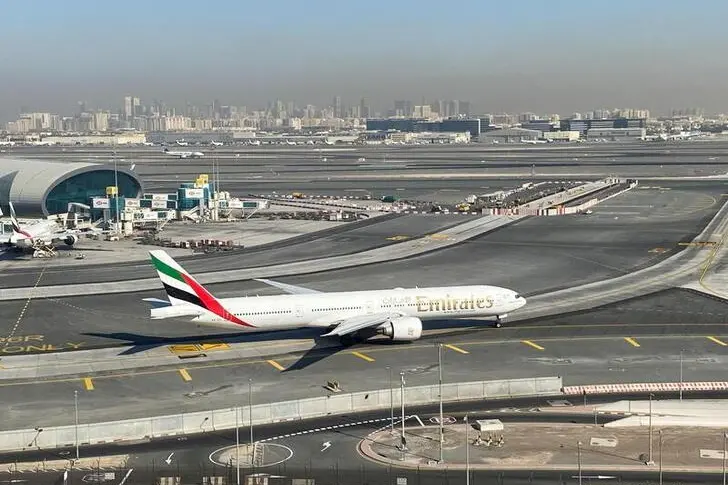PHOTO
Emirates Group, the operator of Emirates airline, has slashed its total workforce by more than a third in a series of job cuts due to lack of demand in air travel that was triggered by COVID-19, the company said on Tuesday.
"For the first time in the Group's history, redundancies were implemented across all parts of the business. As a result, the Group's total workforce reduced by 31 percent," the company said in a statement.
The state-owned Dubai-based aviation holding company posted its first loss in over 30 years, reporting a 22.1 billion dirhams ($6 billion) deficit for the financial year ended March 31, 2021, as it grappled with a huge revenue fall caused by the outbreak.
“In 2020-21, Emirates and Dnata were hit hard by the drop in demand for international air travel as countries closed their borders and imposed stringent travel restrictions,” said Sheikh Ahmed bin Saeed Al Maktoum, chairman and chief executive of Emirates Airline and Group.
“The COVID-19 pandemic continues to take a tremendous toll on human lives, communities, economies, and on the aviation and travel industry.”
The carrier has been among the worst-hit since the outbreak began last year. Passenger air traffic plummeted by approximately 90 percent in 2020, as mobility restrictions and border closures, coupled with a fall in consumer sentiment, prompted people to postpone leisure and business trips.
With the fall in demand, the aviation company has had to cut more than 33,000 jobs, reducing its total payroll by 31 percent to 75,145 employees that represent more than 160 different nationalities. Between 2019 and 2020, the Group employed more than 100,000 employees.
Besides implementing redundancies, the Group also asked workers based in the UAE to take a six-month salary cut, while other staff also "supported the company through a combination of pay cuts, furlough or job support programmes".
In order for it to sustain its operations and avoid further job cuts, the airline confirmed it has received capital injections totalling 11.3 billion dirhams from Dubai government. One of its subsidiaries, Dnata, also managed to tap on various industry support and job saver initiatives, providing approximately 800 million dirhams in financial relief.
Passenger, cargo, revenues
Emirates airline’s total passenger and cargo capacity fell by 58 percent to 24.8 billion ATKMs at the end of 2020-21, due to pandemic-related flight and travel restrictions, including a complete suspension of commercial passenger services for nearly eight weeks in the UAE, from March 25, 2020.
The airline reported a loss of 20.3 billion after last year’s 1.1 billion profit, and a negative profit margin of 65.6 percent. This includes a one-time impairment charge of 710 million dirhams mainly relating to certain aircraft which are currently grounded.
Recovery
Ahmed said the recovery “will be patchy”, but he’s confident that Emirates’ capacity will be restored “as quickly as possible”.
“Until 2020-21, Emirates and Dnata have had a track record of growth and profitability, based on solid business models, steady investments in capability and infrastructure, a strong drive for innovation, and a dep talent pool led by a stable leadership team.”
“These fundamental ingredients of our success remain unchanged. Together with Dubai’s undiminished ambitions to grow economic activity and build a city for the future, I am confident that Emirates and dnata will recover and be stronger than before,” he said.
In the year ahead, Ahmed said the company will continue to adopt an agile approach. “We aim to recover to our full operating capacity as quickly as possible.”
(Reporting by Cleofe Maceda; editing by Seban Scaria)
Disclaimer: This article is provided for informational purposes only. The content does not provide tax, legal or investment advice or opinion regarding the suitability, value or profitability of any particular security, portfolio or investment strategy. Read our full disclaimer policy here.
© ZAWYA 2021





















